翻译课程 第8讲 正说反译和反说正译
- 格式:doc
- 大小:5.76 MB
- 文档页数:11
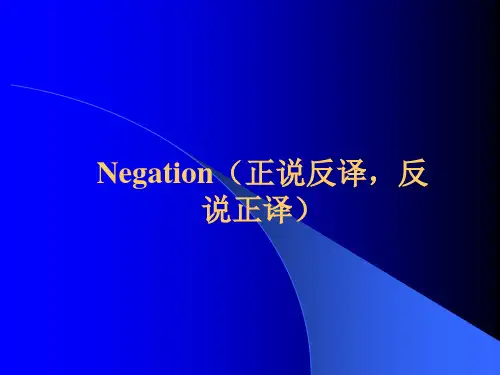
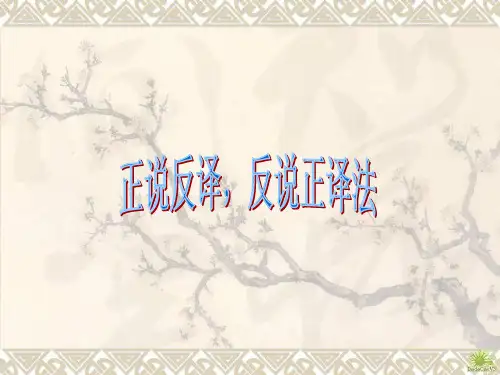
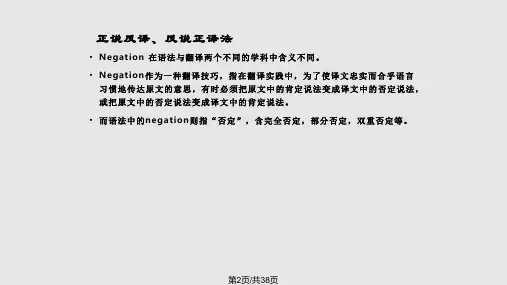


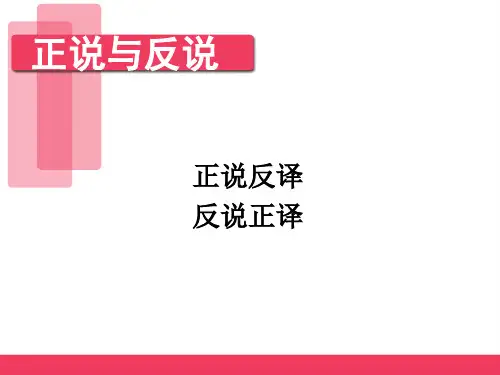
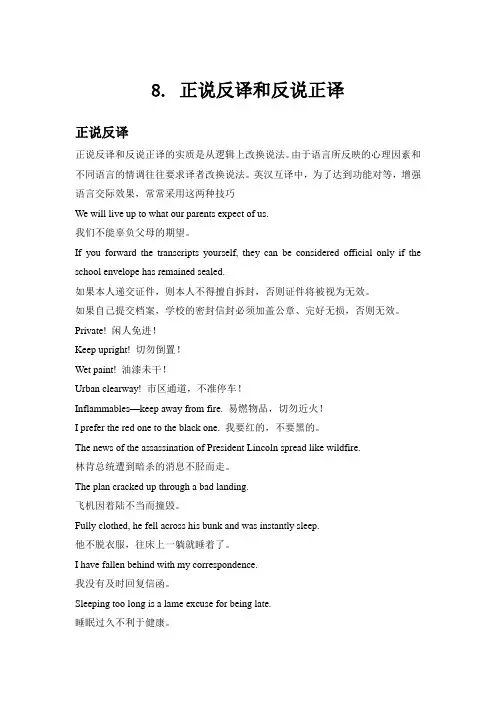
8. 正说反译和反说正译正说反译正说反译和反说正译的实质是从逻辑上改换说法。
由于语言所反映的心理因素和不同语言的情调往往要求译者改换说法。
英汉互译中,为了达到功能对等,增强语言交际效果,常常采用这两种技巧We will live up to what our parents expect of us.我们不能辜负父母的期望。
If you forward the transcripts yourself, they can be considered official only if the school envelope has remained sealed.如果本人递交证件,则本人不得擅自拆封,否则证件将被视为无效。
如果自己提交档案,学校的密封信封必须加盖公章、完好无损,否则无效。
Private! 闲人免进!Keep upright! 切勿倒置!Wet paint! 油漆未干!Urban clearway! 市区通道,不准停车!Inflammables—keep away from fire. 易燃物品,切勿近火!I prefer the red one to the black one. 我要红的,不要黑的。
The news of the assassination of President Lincoln spread like wildfire.林肯总统遭到暗杀的消息不胫而走。
The plan cracked up through a bad landing.飞机因着陆不当而撞毁。
Fully clothed, he fell across his bunk and was instantly sleep.他不脱衣服,往床上一躺就睡着了。
I have fallen behind with my correspondence.我没有及时回复信函。
Sleeping too long is a lame excuse for being late.睡眠过久不利于健康。
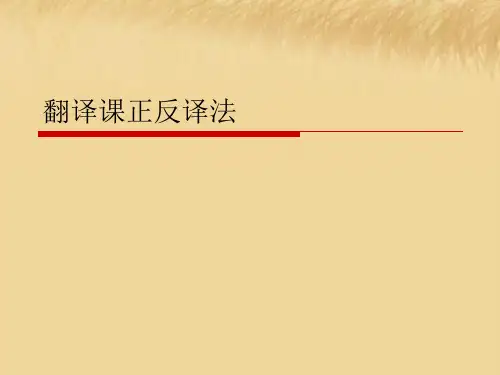
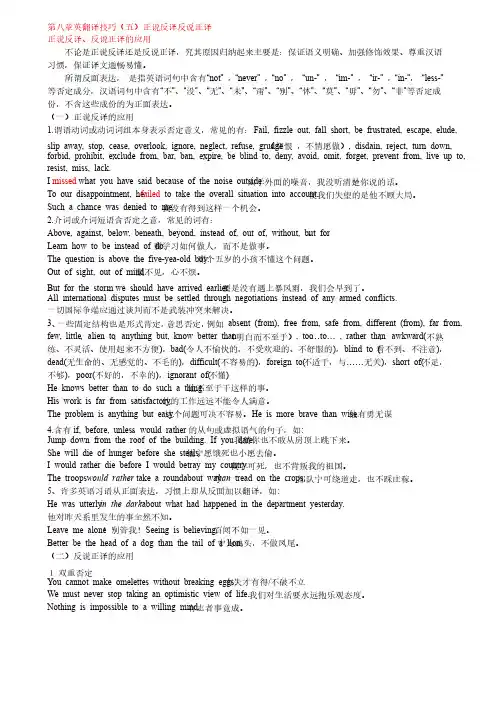
第八章英翻译技巧(五)正说反译反说正译正说反译、反说正译的应用不论是正说反译还是反说正译,究其原因归纳起来主要是:保证语义明确、加强修饰效果、尊重汉语习惯,保证译文通畅易懂。
所谓反面表达,是指英语词句中含有“not”,“never”,“no”,“un-”,“im-”,“ir-”,“in-”,“less-”等否定成分,汉语词句中含有“不”、“没”、“无”、“未”、“甭”、“别”、“休”、“莫”、“毋”、“勿”、“非”等否定成份,不含这些成份的为正面表达。
(一)正说反译的应用1.谓语动词或动词词组本身表示否定意义,常见的有:Fail, fizzle out, fall short, be frustrated, escape, elude, slip away, stop, cease, overlook, ignore, neglect, refuse, grudge(怨恨,不情愿做), disdain, reject, turn down, forbid, prohibit, exclude from, bar, ban, expire, be blind to, deny, avoid, omit, forget, prevent from, live up to, resist, miss, lack. I missed what you have said because of the noise outside.由于外面的噪音,我没听清楚你说的话。
To our disappointment, he failed to take the overall situation into account. 使我们失望的是他不顾大局。
Such a chance was denied to me.我没有得到这样一个机会。
2.介词或介词短语含否定之意,常见的词有:Above, against, below, beneath, beyond, instead of, out of, without, but for。
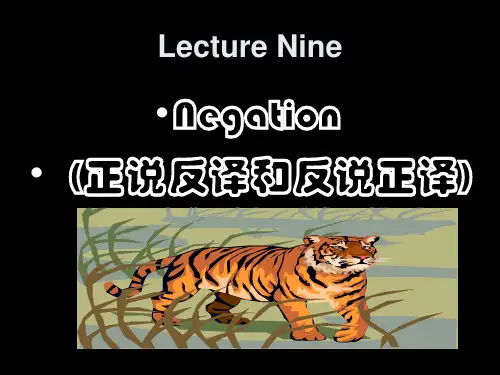
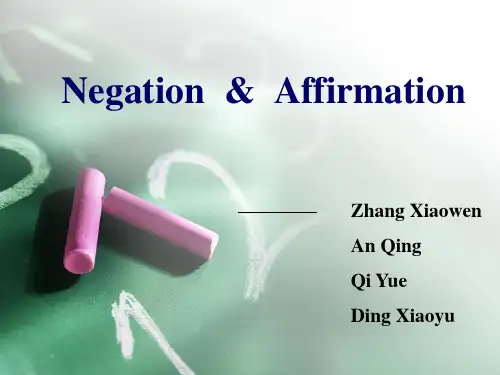
74英汉翻译中的正说反译和反说正译的探讨岳淑珍( 辽宁对外经贸学院,辽宁 大连 116052 )【摘 要】本文通过对英语句子的翻译,简要论述了英语翻译中的正说反译法和反说正译法。
英语否定结构的翻译是英汉翻译中的一个重点,也是难点。
本文作者按照词性进行分类,论述了各种正译与反译的翻译方法,为高校非英语专业的英语教师及参加四六级考试的学生,提供了切实可行的翻译技巧。
【关键词】否定;正说;反译;反说;正译由于社会文化背景不同,人们的思维方式有很大的差异。
这种差别体现在语言习惯上,就产生了语言各自独特的表达形式。
英汉两种语言在表达否定意义时,这种差异尤为突出。
英语与汉语都可以从正面或者反面来表达同一概念。
在翻译过程中,有些从正面表达的语句可以处理成反面表达,也可以把反面表达的内容处理成正面表达。
这种把正说处理成反说的译法被称作“反译”,把反说处理成正说的译法被称作“正译”。
有时候语言的正反表达形式不能对译,必须进行正反转换,以保证译文的流畅和通顺。
一、正说反译有些英语句子在形式和内容上虽然都是肯定的,但有时需要根据汉语表达习惯及修辞或语气的要求译成否定形式,才能更好地表达原文内容。
翻译以下词汇和短语时可运用正说反译的方法。
1.正说反译 — 动词miss(错过),deny(否认,剥夺),fail(不及格,未成功),lack (缺乏),ignore (不顾,不理),neglect(忽视),overlook(不注意), exclude(排除),refrain from(克制), refuse(拒绝),lose(丧失)1)I missed what you have said because of the noise outside.由于外面的噪音,我没听清楚你说的话。
2)She’s still feeling pretty low about failing that exam.由于没有通过那次考试,她的情绪仍然低落。
广西师范学院《英汉互译(一)》课程教案编号: 15-8 开课单位:外语系授课教研室:翻译写作课程名称:《英汉互译(一)》授课教师:唐旭光教材:《新编英汉互译教程》,授课对象:06级英语专业2、3、5班授课时间:授课时数:2 课时授课课题11. Translation of AffirmativeSentences授课形式讲练课教学目的与要求Translation techniques in Affirmative Sentences教学重点Translation of Affirmative Sentences教学难点Translation of Affirmative Sentences教学方法与手段理论讲解与翻译操练相结合教学内容及过程设计 1.知识点介绍一、正说反译1. Introduction2. 原文中正说的动词在译文中从反面表达3. 原文正说的名词在译文中从反面表达4. 原文中正说的形容词在译文里从反面表达5. 原文中正说的副词在译文里从反面表达6. 原文中正说的副词在译文里从反面表达7. 原文中的介词在译文里从反面表达8. 原文中的连词或关联词在译文从反面表达9. 原文中正说的词组在译文里从反面表达10. 原文中正说的词组在译文里从反面表达11. 原文中正说的句子在译文里从反面表达12. 原文中正说的句子在译文里从反面表达二、反说正译1. Introduction2. 原文中反说的动词在译文中从正面表达3. 原文中反说的名词在译文中从正面表达4. 原文中反说的动词在译文中从正面表达5. 原文中反说的副词在译文中从正面表达6. 原文中反说的形容词在译文中从正面表达7. 原文中反说的形容词在译文中从正面表达8. 原文中反说的词组在译文中从正面表达2. 翻译操练与练习讲评作业Exercises P209-211,专八翻译(活页)练习课后小结参考资料《英汉互译(一)》第八讲正说反译与反说正译(Conversion Between Positive and Negative Expressions)一、正说反译1. IntroductionA sentence can be made with positive and negative expressions. A positive sentence in English is one in which there is / are no negative word (s) like no, never, not, or no negative word(s) with a negative affix like none-, de-, dis-, -less, etc. A positive sentence in Chinese is one where you do not find such words as “不”、“没有”、“无”、“非”、“未”、“否”、“休”、“勿”、“别”、“莫”、“毋”. As Chinese and English are quite different from each other in their respective usage, the same idea or concept may be translated into either a positive form or a negative form. A positive sentence may be rendered into a negative one and vice versa. Sometimes, a positive sentence may be translated into either a positive one or a negative one, which depends on the context. In many cases nouns, verbs, adjectives, adverbs and prepositions in their positive forms are put into their negative forms in the version so that the version becomes quite idiomatic and very faithful.2. 原文中正说的动词在译文中从反面表达1. If they think that that clinches the argument against deregulation of the economy, they miss a crucial point.如果他们认为那样做就能证明反对撤消经济调节之说言之有理,那么他们就没有抓住问题的要害。
翻译课程第8讲正说反译和反说正译广西师范学院《英汉互译(一)》课程教案编号: 15-8 开课单位:外语系授课教研室:翻译写作课程名称:《英汉互译(一)》授课教师:唐旭光教材:《新编英汉互译教程》,授课对象:06级英语专业2、3、5班《英汉互译(一)》第八讲正说反译与反说正译(Conversion Between Positive and Negative Expressions)17. He reminded me of what I should otherwise have forgotten.他提醒了我,要不然我就会把这事忘了。
7. 原文中的介词在译文里从反面表达18. The book is beyond the knowledge of a five-year-old child.这本书五岁孩子读不懂。
19. I am embarrassed to write of “God’s presence”. God is off my beat.我决不会就“上帝的存在”挥笔撰文,上帝不属于我工作的范围。
20. Child-development experts warn parents against placing unreasonable expectations on school-age children.儿童成长专家警告说,家长不要对学龄儿童寄予不合理的期望。
21. How delightful it would be, I thought, to have months of clean snow and a landscape sparkling with frost instead of innumerable gray featureless days of rain and raw winds.我想,如果我们这里经常是个冰雪积月、霜华璀璨的景色,而不是像现在这种苦雨凄风永无尽期的阴沉而乏特色的日子,那该会多么令人喜悦啊!22. His behavior is above praise.他的行为不止是值得称赞的。
8. 原文中的连词或关联词在译文从反面表达23. Before he arrived at the bus stop, the touring party was gone.他还没到公车站,旅行团就出发了。
24. Until we are intelligible as to its laws and varieties, the main complicating facts of human life must remain unintelligible.我们不懂得风俗所起作用的规律和它的种种表现,也必然不会理解人类生活中那些越来越复杂的主要方面。
25. He ( Kant ) had a crooked nose, but a fine brow and his color was fresh.他(康德)生就一个鹰勾鼻子,不过眉目还算清秀,气色也不错。
26. Peter will fail in the exam again unless he concentrates on his study.如果彼得不用心学习,他考试还会不及格。
9. 原文中正说的词组在译文里从反面表达27. Pakistan has castigated the U.N. Security Council for washing its hands of the volatile situation in Kashmir.巴基斯坦严厉批评联合国安理会对克什米尔爆炸性局势撒手不管。
28. The President charged head down at the bill introduced by the opposition, with the result that it had to be put on ice.总统不顾一切地抨击反对党提出的议案,结果使它被搁置。
29. She has an incisive manner of speaking, happily free from ums and ers, and, perhaps, a tribute to the elocution lessons she took while still a young girl.她说话锋利尖锐,好在没有哼哼哈哈的拖腔,或许这应归功于她少女时代所上的演讲课的训练。
30. Far from benefiting consumers, alliances and mergers between firms may give them undue influence over the market.公司联手、合并远远不能给顾客带来实惠,反而可能使这些公司对市场拥有不适当的影响力。
31. But for her the race of the world would have trampled him underfoot, a squashed boneless snail.要不是有她,他早就被你争我夺的社会踩在脚下变成一摊稀烂的蜗牛泥了。
10. 原文中正说的词组在译文里从反面表达32. This is at odds with astronomical data.这与天文资料记载不符。
11. 原文中正说的句子在译文里从反面表达33. The problem is too complicated for us common people to solve it.这个问题太复杂了,我们常人根本无法解决它。
34. Third World countries have been losing everything.第三世界国家逐渐变得一无所有。
35. A gentleman is, rather than does.绅士生而是之,并非学而为之。
36. “ Oh! My dear Mr. Bennet,”said she as she entered the room, “ We have hada most delightful evening, a most excellent ball. I wish you had been there.”“噢!我的好老爷,”她一走进房间就这么说,“我们这一个晚上过的太快活了,舞会太好了。
你没有去真可惜。
”37. Great is the art of beginning, greater is the art of ending.善始固然不易,善终尤为难得。
12. 原文中正说的句子在译文里从反面表达38. This would be the last place the colonialists would leave, for in it lay riches and natural resources.这是殖民者最不愿离开的地方,因为这里蕴藏着财富和自然资源。
39. We breathe but the air of books.书香仿佛空气,无处不在。
二、反说正译1. IntroductionIn many cases nouns, verbs, adjectives, adverbs and prepositions in their negative forms are put into their positive forms in the version so that the version becomes quite idiomatic and very faithful. Plenty of examples are provided to confirm this translation technique.2. 原文中反说的动词在译文中从正面表达40. South America has unshackled its trade, restructured its rickety banks and tightened its fiscal belt.南美洲开放了贸易,整顿了自己摇摇欲坠的银行,紧缩了财政开支。
41. The most nonsensical notion, the most causal slip of the tongue, the most fantastic dream, must have a meaning and can be used to unriddle the often incomprehensible maneuvers we call thinking.最不理智的想法,最不经意的失言,最荒诞的梦境也必有意义,它们还可以用来解释被我们称作思维的通常不可理解的活动。
42. Secrets, silent, strong sit in the dark palaces of both our hearts: secrets weary of their tyranny: tyrants, willing to be dethroned.我们两人心灵深处的黑殿里,都盘踞着沉默不语、纹丝不动的秘密,这些秘密已经倦于自己的专横统治,是情愿被人赶下去的暴君。
43. “ Don’t unstring your shoes, Rooby,” she said.她说:“把鞋带系上,罗比。
”44. They are soft, good-natured, and easy-going. They never deny their children any wish, and cheerfully run to buy anything their children ask for.他们性情温柔,心地善良,宽容随和。
他们往往迁就孩子,总是满心欢喜地跑去买孩子要求的任何东西。
3. 原文中反说的名词在译文中从正面表达45. He was thrown into unemployment when the factory closed, and now he is living on the unemployment compensation.工厂关闭后他就失业了,现在他靠失业救济金度日。
46. In general, she could accept the family life in all its crowded inadequacy.在通常情况下,她还是能够忍受她那拥挤寒碜的家庭生活47. The government has worked out new plans for disarmament.政府制定出了裁军的新方案。